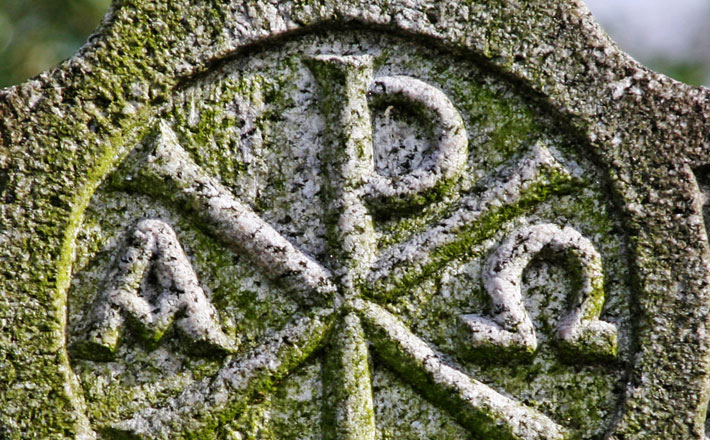Commentary on John 17:20-26
John 17 brings us to the end of Jesus’ farewell to his disciples.
The timing is a bit confusing to listeners. We celebrated Easter at the end of March, but the last few weeks we’ve gone back before Easter to Jesus’ last meal with his disciples. We’ve been sitting at the Passover table, leaning close to hear Jesus’ final promises to his disciples. Chapter 17 is Jesus’ closing prayer. He looks up to heaven and prays first for himself. This is not the agonizing prayer in Gethsemane found in the other gospels. Jesus is not in agony nor is he confused. “Father, the hour has come; glorify your Son so that the Son may glorify you.” Sometimes, Jesus seems to be praying for somebody else — he says “your Son” then “the Son” then “glorify me.” We hear a mixture of Jesus and the gospel writer mingled together in one prayer.
Then Jesus moves on to pray for those who are sitting at the table with him. Jesus is praying like a mother who has adopted these children. They belonged to God, but God gave them to Jesus to care for, to teach, to nurture. Soon Jesus will go away and he prays for these children with the love of a motherly heart.
I remember talking to a woman whose son was in our youth group. “Every time he goes out of the house, I say a prayer that he’ll be safe,” she told me. “You know, when there are more than two black boys walking down the street, people get suspicious. They attract attention from the police. It happens all the time,” she said. ”Even if they don’t do anything, they’re likely to get in trouble. So I keep praying until he comes back in the door.”
Jesus’ prayer doesn’t stop with those seated at the table. “I ask not only on behalf of these, but also on behalf of those who will believe in me through their word, that they may all be one.” Jesus is praying also for you and for me. We are the ones who have come to believe because of the disciples’ words. Jesus’ prayer hangs in the space between earth and heaven, between time past and time present and time yet to come. Jesus is praying that we will remain faithful and trust in the presence of the Holy Spirit.
Just when we think we’ve figured out what’s going on in John’s gospel, we are surprised at every turn. Jesus proclaims God’s love for the world, yet prays that these beloved children will be protected from the world. Jesus speaks of himself as the Good Shepherd whose sheep hear his voice — yet, just when we’re ready to shut the gate, Jesus says, “I have other sheep that are not of this fold — I must bring them also.” Just when we point to John’s gospel to confirm that God is our Father, we hear Jesus praying from a mother’s heart. Even in John’s fatherly gospel, we see a picture of Jesus who seems very much like a mother.
Perhaps we should have known from the first chapter of John. “In the beginning was the Word and the Word was with God and the Word was God.” This eternal, cosmic Word (with a capital W) translates the Greek word logos. Yet, everything that is said about the Word comes from Old Testament descriptions of Wisdom. Wisdom, coming forth from the mouth of God. Wisdom, pitching a tent to dwell upon earth. Wisdom, beside God as co-creator from the beginning. Wisdom, the female figure translated in Greek as Sophia. Indeed, Raymond Brown, in his classic commentary on the Gospel of John, says that “there are parallels to Wisdom in almost every detail” found in the opening verses of the gospel.1 The reason John chose logos instead of sophia was because Jesus was male.
Can we be open to God’s surprises? Could it be that the Spirit that moved over the waters in creation became a mothering presence in the Gospel of John? Could it be that when we insist that God can only be called Father, the Spirit of truth whispers other names in our ears? Jesus, prayed for his beloved, adopted children on the last night of his life. He prayed that they would be one, even as Jesus and his motherly Father are one.
The life of faith is a journey filled with surprises. Just when we think Mother’s Day is about cards and flowers, we’re reminded that the original Mother’s Day proclamation urged an end to war: “We women of one country will be too tender of those of another country to allow our sons to be trained to injure theirs.”2 (Julia Ward Howe) Just when we think we know all about Jesus the Good Shepherd, he’s out looking for sheep beyond our fold. Just when we think the Word — capital W — is an abstract philosophical word, we’re reminded that Jesus is Wisdom/Sophia in earthly flesh. Just when we argue that God can only be called “Father” we hear Jesus praying as a mother worried for her children. “I will not leave you orphaned,” Jesus said. You are my own and I will be with you forever.
This is the wondrous mystery revealed to Julian of Norwich in the 14th century. This well-educated Christian woman devoted her life to God through study and contemplation of scripture. She wrote a theological treatise entitled “Showings” and her words have now become a hymn that we might rightly sing today: “Mothering God, you gave me birth. Mothering Christ, you took my form. Mothering Spirit, nurturing One.” God is always more than we imagined. God is always closer than we had dared to dream.
Notes:
1 Raymond E. Brown, The Gospel According to John I – XII (Garden City, NY: Doubleday & Company, 1966) 523
2 http://www.plough.com/en/topics/culture/holidays/mothers-day/the-original-mother-s-day-proclamation


May 8, 2016